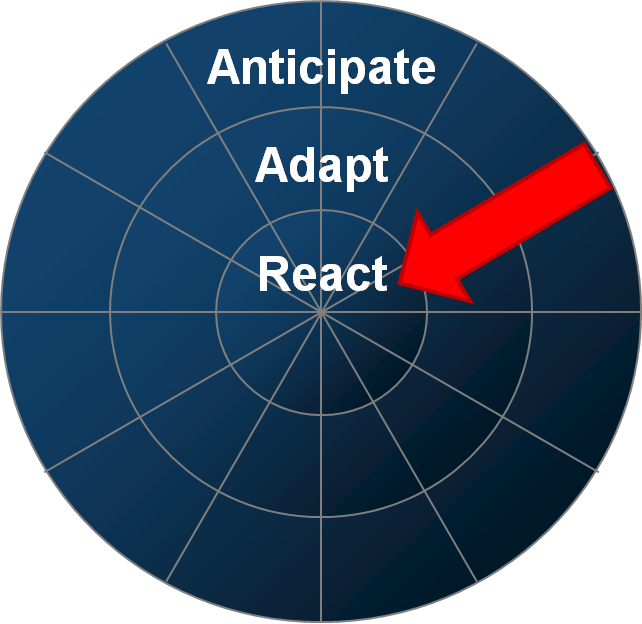Business models in the era of COVID-19
Background:
I co-authored The Prepared Mind of Leader, which was published in 2006. The book focused on the skills leaders need that will prepare them for the future. The context for using these skills is a model that I referred to as the Sense-Response Cycle™.

I’ve used this model in hundreds of workshops over the past fifteen years to organize and prioritize thinking about strategy for organizations, large and small.
The perimeter (Sense >> Make Sense >> Decide >> Act) identifies the four responsibilities of anyone in a leadership role.
The “punchline” is that leaders must consider industry evolution and then run the cycle fast enough to keep up with the evolution – or their organization becomes irrelevant.
COVID-19
Although the cycle is closed-looped, the natural starting point is the upper left corner, Sensing the Signals of Tomorrow. As you can see, I use the metaphor of a mental radar screen and its three zones:
- Reaction Zone – deal with today’s problems and opportunities.
- Adaptation Zone – take advantage of irreversible trends.
- Anticipation Zone – prepare for an uncertain future.
One of the questions I ask in every workshop is simple: What’s on the edge of your radar screen and is moving in fast?

Governments, businesses and thought leaders have been aware of a potential pandemic for decades yet have done little because it was on the edge of the radar screen and only of intellectual, not tangible, interest. Ebola and SARS caught our attention, but then disappeared into the background.
Oops! It looks as if this came into the reaction zone much faster than expected.
Business Model Considerations
Here’s the Business Model Canvas, from the popular book Business Model Generation.

Consider the seven components which impact an organization’s cost structure and revenue streams. It’s pretty clear that all seven can (will) be affected by the current pandemic. Consider some of the current changes.
- People are panic-buying food, water, face masks, toilet paper, etc.
- Events worldwide are cancelled.
- Workers are told to work from home, if that’s possible.
- Italy has essentially closed all businesses.
- Free video conferencing services are being overloaded.
- The cruise industry is in serious trouble.
- Airlines have dramatically cut scheduled flights.
- Universities have cancelled in-person classes and assume that education can be done online.
- Supply chains are broken or running late.
And, perhaps most importantly,
- 2019 value propositions are temporarily irrelevant in the short-term. Major or minor changes will be needed in the long-term.
If the pandemic is controlled soon, most businesses will be tempted to “go back to normal.” However, our position is that the current pandemic will bring the need to change value propositions (and business models) for most organizations – there may be no “going back” to normal.
Example: Learning and Development
I’ve spent most of my education career in the face-to-face workshop/classroom world. Wow! Is that going to change for some organizations! Colleges and universities may or may not have the technology needed for remote learning and most faculty are ill-prepared to teach remotely. But there really is no choice. (Remember my earlier point; change as fast as your industry is evolving or become irrelevant.)
But what about businesses? Well, some of our clients are well equipped to shift to remote learning models, others are not. Some have the technology, others do not.
So, what are some of the options, especially for business?
- Continue with in-person workshops.
- Use webinars.
- Use facilitated asynchronous workshops.
- Use un-facilitated asynchronous workshops.
- Encourage self-study and employ certification exams to assure competency.
In summary
Business learning and development needs are not going to go away. However, the on-going shift to online, remote learning is inevitable. Think about what’s best for your workforce and consider the rest of the Sense-Response Cycle. You’ve sensed the need to change because of the pandemic.
- Make sense of your situation (Think critically about your short- and long-term learning challenge.)
- Decide on a course of action (How much risk are you willing to consider?)
- Act and learn (You will not get it perfect right away, but experimentation is needed.)
MindPrep Resource Center has some free tools that my help you think about the future and some of the decisions you will be facing. We have some existing free mini-courses and a few workshops. More are on the way. Visit us at www.mindprep.com
Bill
Never miss out!
Get an email update every time I publish new content. Be the first to know!
